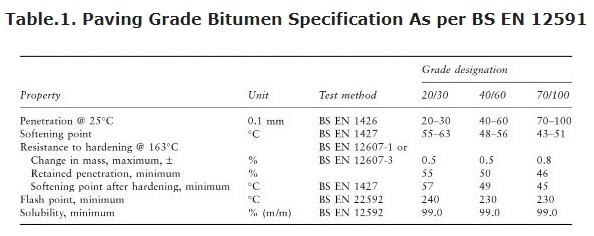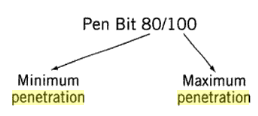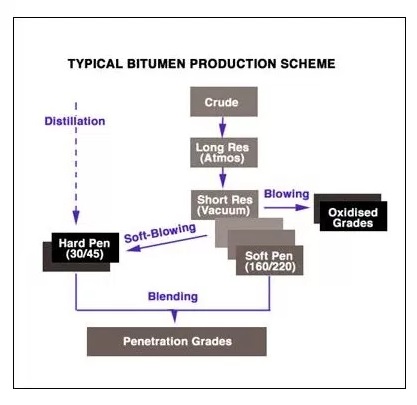Wiki
RAHA Bitumen 60/70 Specification
Bitumen exploration in Ondo, Nigeria
Bitumen in Bag Packing (1MT Jumbo Bag or 300kg Bitubag)

RAHA Bitumen 60/70 Specification
Bitumen exploration in Ondo, Nigeria
Bitumen in Bag Packing (1MT Jumbo Bag or 300kg Bitubag)

The penetration grade bitumen is refinery bitumen that is manufactured at different viscosities. The penetration test is carried out to characterize the bitumen, based on the hardness. Thus, it has the name penetration bitumen. The penetration bitumen grades range from 15 to 450 for road bitumen. But the most commonly used range is 25 to 200. This is acquired by controlling the test carried out i.e. the distillation process. The partial control of fluxing the residual bitumen with the oils can help in bringing the required hardness.

The BS EN 1426 and BS EN 1427 provides the penetration and softening point values for the respective grades, as from Table-1. This will help in identifying the equiviscosity and the hardness of the bitumen grade.
The grades are represented by the penetration values i.e. For example, 40/60 as a penetration value of 50 ± 10.
The BS EN 13303 also gives the measure of loss on heating with respective limits for all penetration bitumen grades. This measure is to ensure that there are no volatile components present.
So, no component whose loss will contribute to the setting and hardening of bitumen during its preparation or lay course is undergone. The BS EN 12592 provides the solubility values to ensure that there is less or no impurities in the bitumen material.
Penetration Grade Bitumen is a standard bitumen usually used as a Paving Grade Bitumen essential for road construction and for the production of asphalt pavements with superior properties, and it's very important once it bounds the aggregates and creates a unique cohesion and stability to the bituminous mix. This grade of Bitumen is mainly used in the manufacture of hot mix asphalt for bases and wearing courses. Penetration Grade Bitumen supplied by RABIT Co is petroleum grade bitumen, manufactured from fractional / vacuum distillation of crude oil. The Bitumen supplied by RABIT is produced from the vacuum residue (short residue) feedstock. Penetration Grade bitumens are specified by the penetration and softening point test. The designation is by penetration range only. The penetration grade bitumens have a thermoplastic property which causes the material to soften at high temperatures and to harden at lower temperatures. This unique temperature/viscosity relationship is important when determining the performance parameters such as the adhesion, rheology, durability and application temperatures of bitumen.
Penetration Grade Bitumen is specified by the penetration and softening point test. The designation is by penetration range only.
The major Penetration Grade Bitumen is Bitumen 60/70 that is generally used for all the markets. Penetration grading’s basic assumption is that the less viscous the asphalt, the deeper the needle will penetrate. This penetration depth is empirically (albeit only roughly) correlated with asphalt binder performance. Therefore, asphalt binders with high penetration numbers (called “soft”) are used for cold climates while asphalt binders with low penetration numbers (called “hard”) are used for warm climates.
The penetration grading system was developed in the early 1900s to characterize the consistency of semi-solid asphalts. Penetration grading quantifies the following asphalt concrete characteristics:
Penetration is determined using an empirical test method. A sample of the bitumen in a small container is stabilized in a water bath at a standard temperature (normally 25 C). A prescribed needle, weighing 100g, is allowed to bear on the surface of the bitumen for 5 sec. The bitumen is defined as the distance, in units of 0.1mm, that the needle penetrates into the bitumen.
some bitumens are obtained by fractioning in a distillation column. Fractioning is the extracting of vapors of different density during the heating of oil. These bitumens are classified according to hardness. The hardness of a sample is determined by inserting a specific type of needle into it and measuring the depth to which the needle is able to penetrate the sample within a given time and temperature. This test is called the standard penetration test, and the bitumen that is tested in this way is called penetration grade bitumen or road grade bitumen.
Because different samples of bitumen grade bitumen have different chemical compositions and their manufacturing is controlled in different ways, they may vary in consistency from semi-solid at room temperature to semi-liquid under the same conditions.
The penetration numbers obtained by means of the penetration test indicate the hardness of the bitumen. 15 "pen" bitumen is the hardest and 450 pen bitumen the softest. In the construction industry, the term "penetration grade bitumen" is often abbreviated to "pen bitumen" or simply "pen bit".

Penetration grade bitumen forms the basis of other road binders such as cutbacks, emulsions, and polymer-modified binders, which are all discussed below.
Bitumen grades are specified primarily in terms of their needle penetration (referred to as 'pen'). Soft bitumens have high pen numbers and hard bitumens have low pen numbers. Within specifications, however, there are certain other criteria which must be met including softening point, solubility, and resistance to hardening. Descriptions of these test methods, which form the basis for most bitumen specifications, now follow.

The Tests involves subjecting a sample of bitumen to needle bitumen under specified conditions of time, temperature and load. In most cases, the test is carried out at 25°C with a load of 100g for a duration of 5 s. Low-temperature bitumen is also measured occasionally with the usual conditions being 5°C with a load of 200 g for the 60s. The depth of bitumen of the needle into the surface of the bitumen is measured in tenths of a millimeter (dmm); hence 200 pen bitumen has a needle penetration of 200 dmm at 25°C when measured with a load of 100g for 5 s. It is common practice to describe the penetration of a particular bitumen without the unit, i.e. 100 pen means a penetration of 100 dmm.
The Softening Point Test the Softening Point Test° involves preparing discs of bitumen and determining the temperature at which these discs are unable to support a standard metal ball (Fig. 2.8). At the softening point, all unmodified bitumens have approximately equal penetration (800 dmm) and viscosity (1200 Pas). The softening point is, therefore, an approximation of the equi-viscous temperature (EVT) for bitumen. It is possible to obtain an estimate for the temperature susceptibility of the bitumen from a knowledge of the penetration and softening point. Equations developed by Pfeiffer and Van Doormal2() demonstrate that a Penetration-Index (PI), which estimates the effect of temperature on the properties of the bitumen, can be determined. The higher the PI, the more temperature susceptible will be the bitumen. The PI has traditionally been used as part of the specification for bitumen, particularly in mainland Europe.